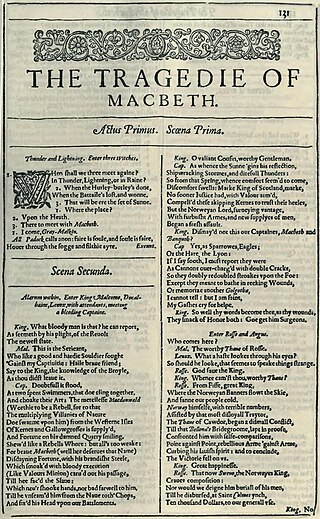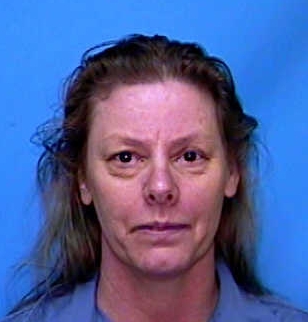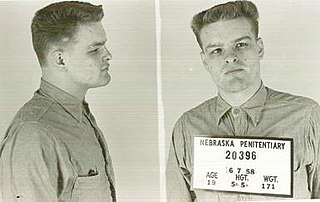Related Research Articles

The Tragedy of Macbeth, often shortened to Macbeth, is a tragedy by William Shakespeare. It is thought to have been first performed in 1606. It dramatises the damaging physical and psychological effects of political ambition on those who seek power. Of all the plays that Shakespeare wrote during the reign of James I, Macbeth most clearly reflects his relationship with King James, patron of Shakespeare's acting company. It was first published in the Folio of 1623, possibly from a prompt book, and is Shakespeare's shortest tragedy.

Leave Her to Heaven is a 1945 American psychological thriller film noir melodrama directed by John M. Stahl and starring Gene Tierney, Cornel Wilde, Jeanne Crain, and Vincent Price. It follows a socialite who marries a prominent novelist, which spurs a violent, obsessive, and dangerous jealousy in her. It is based on the 1944 novel of the same name by Ben Ames Williams, adapted by screenwriter Jo Swerling.

Aileen Carol Wuornos was an American serial killer. In 1989–1990, while engaging in street prostitution along highways in Florida, she shot dead and robbed seven of her male clients. Wuornos claimed that her clients had either raped or attempted to rape her, and that the homicides of the men were committed in self-defense. Wuornos was sentenced to death for six of the murders. She was executed on October 9, 2002, by lethal injection after spending more than 10 years on Florida's death row.

Gary Mark Gilmore was an American criminal who gained international attention for demanding the implementation of his death sentence for two murders he had admitted to committing in Utah. After the U.S. Supreme Court upheld a new series of death penalty statutes in the 1976 decision Gregg v. Georgia, he became the first person in almost ten years to be executed in the United States. These new statutes avoided the problems under the 1972 decision in Furman v. Georgia, which had resulted in earlier death penalty statutes being deemed "cruel and unusual" punishment, and therefore unconstitutional. Gilmore was executed by a firing squad in 1977. His life and execution were the subject of the 1979 nonfiction novel The Executioner's Song, by Norman Mailer, and the 1982 TV film of the novel starring Tommy Lee Jones as Gilmore.

Charles Raymond Starkweather was an American spree killer who murdered eleven people in Nebraska and Wyoming between November 1957 and January 1958, when he was nineteen years old. He killed ten of his victims between January 21 and January 29, 1958, the date of his arrest. During his spree in 1958, Starkweather was accompanied by his fourteen-year-old girlfriend, Caril Ann Fugate.

William Henry Bury was suspected of being the notorious serial killer "Jack the Ripper". He was hanged for the murder of his wife Ellen in 1889, and was the last person executed in Dundee, Scotland.

Annie Mae Aquash was a First Nations activist and Mi'kmaq tribal member from Nova Scotia, Canada. Aquash moved to Boston in the 1960s and joined other First Nations and Indigenous Americans focused on education and resistance, and police brutality against urban Indigenous peoples. She was part of the American Indian Movement, participated in several occupations, and participated in the 1973 Wounded Knee incident at the Pine Ridge Indian Reservation, United States.

The Hi-Fi murders were the torture of five people resulting in three deaths during a robbery at the Hi-fi Shop, a home audio store in Ogden, Utah, United States, on the evening of April 22, 1974. Several men entered the Hi-fi Shop shortly before closing time and began taking hostages. They forced their victims to drink corrosive drain cleaner, which the perpetrators believed would fatally poison their hostages, but instead caused burns to their mouths and throats. Further violence included kicking a pen into an ear and the brutal rape of an eighteen-year-old woman, before three of the victims were fatally shot. The two surviving victims were left with life-changing injuries.

Catherine Ada Kelly was the younger sister of Australian bushranger and outlaw Ned Kelly.

Sallie-Anne Huckstepp was an Australian writer, sex-worker and whistle blower, who was the victim of an underworld homicide. She came to attention in 1981 for speaking out about police corruption in Sydney. Huckstepp's murder remains unsolved.

Jesse Joseph Tafero was convicted of murder and executed via electric chair in the U.S. state of Florida for the murders of 39-year-old Florida Highway Patrol officer Phillip A. Black and 39-year-old Ontario Provincial Police Corporal Donald Irwin, a visiting Canadian constable and friend of Black. The officers were killed during a traffic stop where Tafero, his wife Sunny Jacobs and their children were passengers. Tafero's execution was botched; his head burst into flames during the execution by electric chair. After Tafero's execution, the driver, Walter Rhodes, confessed to shooting the officers, but later retracted his testimony.

Star Stowe was an American model. She was Playboy magazine's Playmate of the Month for its February 1977 issue. Stowe was murdered by an unknown assailant.

In This Our Life is a 1942 American drama film, the second to be directed by John Huston. The screenplay by Howard Koch is based on the 1941 Pulitzer Prize-winning novel of the same title by Ellen Glasgow. The cast included the established stars Bette Davis and Olivia de Havilland as sisters and rivals in romance and life. Raoul Walsh also worked as director, taking over when Huston was called away for a war assignment after the United States entered World War II, but he was uncredited. This film was the third of six films that de Havilland and Davis starred in together.
Ellen Liddy Watson was a pioneer of Wyoming who became known as Cattle Kate, an outlaw of the Old West, although the characterization is a dubious one, as subsequent research has tended to see her as a much maligned victim of a self-styled land baron. Watson had acquired homestead rights on land with water resources vital to the wealthiest rancher in the county, Albert Bothwell, when she was accused by him of cattle rustling. She was abducted from her home and lynched along with her husband by Bothwell and some other ranchers he had incited against her. The bodies were left hanging for two days, and the reputation that attached to her until recently was quickly established by newspaper publicity. Accounts of Watson as a rustler are now regarded as highly biased. Her life has become an Old West legend and inspired a number of television and film accounts.

The Red Barn Murder was a 1827 murder in Polstead, Suffolk, England. A young woman, Maria Marten, was shot dead by her lover William Corder at the Red Barn, a local landmark. The two had arranged to meet before eloping to Ipswich. Corder sent letters to Marten's family claiming that she was well, but after her stepmother spoke of having dreamed that Maria had been murdered, her body was discovered in the barn the next year.
On May 16, 1918, a plantation owner was murdered, prompting a manhunt which resulted in a series of lynchings in May 1918 in southern Georgia, United States. White people killed at least 13 black people during the next two weeks. Among those killed were Hazel "Hayes" Turner and his wife, Mary Turner. Hayes was killed on May 18, and the next day, his pregnant wife Mary was strung up by her feet, doused with gasoline and oil then set on fire. Mary's unborn child was cut from her abdomen and stomped to death. Her body was then repeatedly shot. No one was ever convicted of her lynching.

Illegal is a 1955 American film noir directed by Lewis Allen. It stars Edward G. Robinson, Nina Foch, Hugh Marlowe and Jayne Mansfield. It is the third film adaptation of the 1929 play "The Mouthpiece" by Frank J. Collins, following The Mouthpiece and The Man Who Talked Too Much.

In Forsyth County, Georgia, in September 1912, two separate alleged attacks on white women in the Cumming area resulted in black men being accused as suspects. First, a white woman reportedly awoke to find a black man in her bedroom; then days later, a white teenage girl was beaten and raped, later dying of her injuries.
Capital punishment has never been practiced Alaska throughout its history as a state, as it was abolished in 1957. Between December 28, 1869, and April 14, 1950, between the Department, District, and Territory of Alaska, twelve felons, all male, were executed by hanging for murder, robbery, and other crimes. Some were European, some were Native American, and two were African. The territorial legislature abolished capital punishment in 1957 during preparations for statehood, making Alaska the first in the West Coast of the United States to outlaw executions, along with Hawaii, which did the same.

In the early morning hours of November 15, 1959, four members of the Clutter family – Herb Clutter, his wife, Bonnie, and their teenage children Nancy and Kenyon – were murdered in their rural home just outside the small farming community of Holcomb, Kansas. Two ex-convicts, Perry Smith and Richard Hickock, were found guilty of the murders and sentenced to death. They were both executed on April 14, 1965. The murders were detailed by Truman Capote in his 1966 non-fiction novel In Cold Blood.
References
Notes
- ↑ "Murder by Gaslight: Poor Ellen Smith". murderbygaslight.com. July 2010. Retrieved 2024-10-22.
- ↑ Bluegrass Banjo For The Complete Ignoramus by Wayne Erbsen, page 23, ISBN 978-1-883206-44-4
- ↑ Across Generations, Traces of a Poor Maid’s Murder, February 1, 2009, The New York Times, retrieved September 4, 2013.